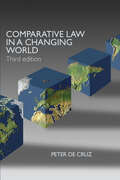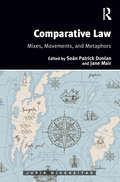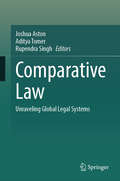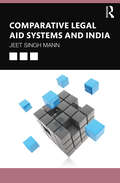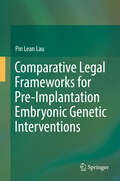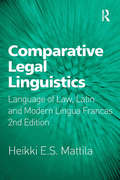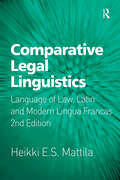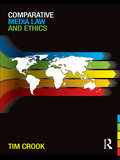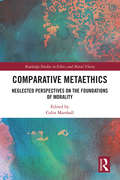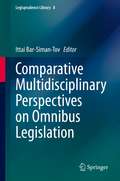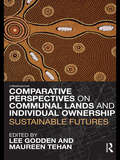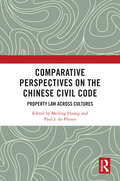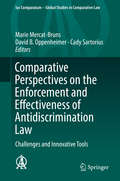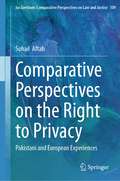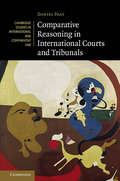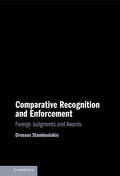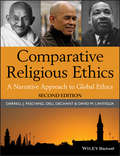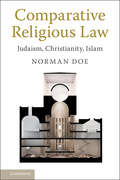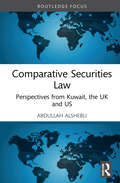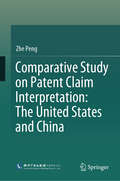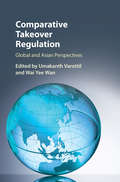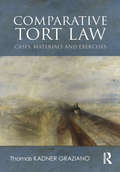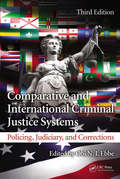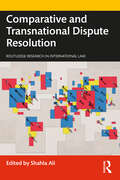- Table View
- List View
Comparative Law in a Changing World
by Peter De CruzProviding a comprehensive and comparative analysis of the legal approach to key areas of law within different legal systems, this book offers a blueprint for comparative legal study by evaluating the current epistemological debate on comparative law and comparative legal research methods.Substantive law, the law of obligations, commercial and corporate law within the major legal systems of the world are all examined and compared. While France and Germany are generally used as the archetypal civil law jurisdictions and English law as the main common law comparator, this third edition also examines the Russian Federation in the post-Soviet era and socialist legal influences as well as non-Western legal traditions. Fully updated and revised to include all recent developments, this edition also includes a broad historical introduction and outlines changes in EC Law.It assesses the possibility of Europeanization of national legal systems and certain legal topics, the impact of the globalization of legal institutions and the evolving 'new world order' in the early twenty-first century.Written in a clear, user-friendly style, Comparative Law in a Changing World is an accessible source for undergraduates and postgraduates wishing to trace the influence of common law and civil law legal traditions on jurisdictions across the world.
Comparative Law: Mixes, Movements, and Metaphors (Juris Diversitas #30)
by Seán Patrick Donlan Jane MairThis book discusses a number of important themes in comparative law: legal metaphors and methodology, the movements of legal ideas and institutions and the mixity they produce, and marriage, an area of law in which culture – or clashes of legal and public cultures – may be particularly evident. In a mix of methodological and empirical investigations divided by these themes, the work offers expanded analyses and a unique cross-section of materials that is on the cutting edge of comparative law scholarship. It presents an innovative approach to legal pluralism, the study of mixed jurisdictions, and language and the law, with the use of metaphors not as an illustration but as a core element of comparative methodology.
Comparative Law: Unraveling Global Legal Systems
by Joshua Aston Aditya Tomer Rupendra SinghThis book, centered on the theme of Comparative Law, offers an unparalleled journey through various legal landscapes, aiming to enhance readers' comprehension by juxtaposing laws from diverse fields and countries. Encompassing areas such as constitutional law, transformative constitution, environmental law, family law, child rights, and artificial intelligence, the book invites readers to navigate the global legal tapestry. What sets this work apart is its meticulous approach, encouraging readers to draw comparisons, fostering a nuanced understanding of legal concepts. Beyond a mere exploration of legal systems, the book delves into the philosophies that underpin them, offering insights into cultural and historical influences. By showcasing best practices from different legal traditions, the book aspires to contribute to the advancement of humanity, promoting the adoption of progressive legal approaches worldwide. This is not just a book; it's a gateway to a world where legal traditions converge, providing readers with a profound and informed perspective on the multifaceted nature of law in our interconnected global society.
Comparative Legal Aid Systems and India
by Jeet Singh MannThis book provides an in-depth analysis of the functioning and challenges of the legal aid system in India. The legal aid system was set up to promote the interests of the economically weaker sections of society that did not have equitable access to judicial systems. However, the system has been largely unsuccessful in delivering justice. Drawing on empirical data from 18 states and 36 districts in India, the book highlights the institutional setbacks that plague the legal aid system and urges us to take cognizance of the hindrances faced by the beneficiaries in availing of these services. It acknowledges the gaps that exist in the governance of the legal aid system in India at the grassroots level and suggests approaches and ways to address these roadblocks to deliver free, swift, and economical access to justice to the poor legal aid beneficiaries. An important critical study of the commitment and competence of legal aid counsels in India, this volume will be an essential read for scholars and researchers of law, Indian law, constitutional law, political science, comparative law, law and gender, and social work.
Comparative Legal Frameworks for Pre-Implantation Embryonic Genetic Interventions
by Pin Lean LauThis book discusses the possibilities for the use of international human rights law (and specifically, international biomedical laws related to the protection of human rights and the human genome) to provide a guiding framework for the future regulation of genetic modifications applied to human embryos and other precursor materials, when these are made with the aim of implanting a genetically altered embryo in a woman. The significance and timeliness of the work derives from the recent availability of CRISPR/Cas9 and other gene editing tools, and from lacunae in international law regarding the legality of embryo modification with these tools and appropriate governance structures for the oversight of resulting practices. The emergence of improved genome editing tools like CRISPR/Cas9, holds the promise of eradicating genetic diseases in the near future. But its possible future applications with Pre-Implantation Genetic Diagnosis (PGD) raises a plethora of legal and ethical concerns about "remaking" future human beings. The work aims to address an urgent call, to embed these rising concerns about biomedical advancements into the fundamental tailoring of legal systems. Suitable regulatory approaches, coupled with careful reflection of global biomedical laws and individual constitutional systems must be explored. The Book analyzes the impact of reproductive biomedical technologies on the legal and ethical dimensions of regulatory frameworks in selected constitutional systems like the US, the UK, Australia, Malaysia and Thailand. Employing a comparative law methodology, the work reveals a dynamic intersection between legal cultures, socio-philosophical reasoning and the development of a human rights-based framework in bio-political studies. Navigating towards a truly internationalized biomedical approach to emerging technologies, it presents an understanding why a renegotiation and reinvigoration of a contemporary and "new" universal shared values system in the international human rights discourse is now necessary.
Comparative Legal Linguistics: Language of Law, Latin and Modern Lingua Francas
by Heikki E.S. MattilaThis book examines legal language as a language for special purposes, evaluating the functions and characteristics of legal language and the terminology of law. Using examples drawn from major and lesser legal languages, it examines the major legal languages themselves, beginning with Latin through German, French, Spanish and English. This second edition has been fully revised, updated and enlarged. A new chapter on legal Spanish takes into account the increasing importance of the language, and a new section explores the use (in legal circles) of the two variants of the Norwegian language. All chapters have been thoroughly updated and include more detailed footnote referencing. The work will be a valuable resource for students, researchers, and practitioners in the areas of legal history and theory, comparative law, semiotics, and linguistics. It will also be of interest to legal translators and terminologists.
Comparative Legal Linguistics: Language of Law, Latin and Modern Lingua Francas
by Heikki E.S. MattilaThis book examines legal language as a language for special purposes, evaluating the functions and characteristics of legal language and the terminology of law. Using examples drawn from major and lesser legal languages, it examines the major legal languages themselves, beginning with Latin through German, French, Spanish and English. This second edition has been fully revised, updated and enlarged. A new chapter on legal Spanish takes into account the increasing importance of the language, and a new section explores the use (in legal circles) of the two variants of the Norwegian language. All chapters have been thoroughly updated and include more detailed footnote referencing. The work will be a valuable resource for students, researchers, and practitioners in the areas of legal history and theory, comparative law, semiotics, and linguistics. It will also be of interest to legal translators and terminologists.
Comparative Legal Studies: Traditions and Transitions
by Pierre Legrand Roderick MundayThe 14 essays that make up this 2003 volume are written by leading international scholars to provide an authoritative survey of the state of comparative legal studies. Representing such varied disciplines as the law, political science, sociology, history and anthropology, the contributors review the intellectual traditions that have evolved within the discipline of comparative legal studies, explore the strengths and failings of the various methodologies that comparatists adopt and, significantly, explore the directions that the subject is likely to take in the future. No previous work had examined so comprehensively the philosophical and methodological foundations of comparative law. This is quite simply a book with which anyone embarking on comparative legal studies will have to engage.
Comparative Media Law and Ethics
by Tim CrookProviding practical and theoretical resources on media law and ethics for the United Kingdom and United States of America and referencing other legal jurisdictions such as France, Japan, India, China and Saudi Arabia, Comparative Media Law and Ethics is suitable for upper undergraduate and postgraduate study and for professionals in the media who need to work internationally. The book focuses on the law of the United Kingdom, the source of common law, which has dominated the English speaking world, and on the law of the USA, the most powerful cultural, economic, political and military power in the world. Media law and ethics have evolved differently in the US from the UK. This book investigates why this is the case. Throughout, media law and regulation is evaluated in terms of its social and cultural context.The book has a companion website at http://www.ma-radio.gold.ac.uk/cmle providing complementary resources and updated developments on the topics explored.
Comparative Metaethics: Neglected Perspectives on the Foundations of Morality (Routledge Studies in Ethics and Moral Theory)
by Colin MarshallThis collection of original essays explores metaethical views from outside the mainstream European tradition. The guiding motivation is that important discussions about the ultimate nature of morality can be found far beyond ancient Greece and modern Europe. The volume’s aim is to show how rich the possibilities are for comparative metaethics, and how much these comparisons offer challenges and new perspectives to contemporary analytic metaethics. Representing five continents, the thinkers discussed range from ancient Egyptian, ancient Chinese, and the Mexican (Aztec) cultures to more recent thinkers like Augusto Salazar Bondy, Bimal Krishna Matilal, Nishida Kitarō, and Susan Sontag. The philosophical topics discussed include religious language, moral discovery, moral disagreement, essences’ relation to evaluative facts, metaphysical harmony and moral knowledge, naturalism, moral perception, and quasi-realism. This volume will be of interest to anyone interested in metaethics or comparative philosophy.
Comparative Multidisciplinary Perspectives on Omnibus Legislation (Legisprudence Library #8)
by Ittai Bar-Siman-TovThis book is the first in the world to provide a cross-national, comparative exploration of omnibus legislation. It contributes to the global debate over omnibus legislation and offers comprehensive, thorough and multifaceted coverage that concerns the fields of legislation and legisprudence, comparative law, political science, public policy and economics. Beyond its relevance for these fields, the book will support practitioners in parliaments, governments and courts, thereby impacting the actual use of omnibus legislation.A new, major and controversial reform is enacted in the middle of the night. It is buried in a massive omnibus bill hundreds of pages in length, which is rammed through the legislative process at breakneck speed. The legislators receive the final version of the bill in the very last minute, and protest that they’ve had no opportunity to read it in detail and know what they’re voting upon. The majority party’s legislative leaders, however, are unimpressed, and the law is eventually passed on the basis of strict party discipline.Though it may sound far-fetched, this scenario is all too familiar in many legislatures around the world. The legislative practice of combining numerous unrelated measures in one long bill, which is often passed via a highly expedited process, has become a matter of intense debate and criticism in many countries.
Comparative Perspectives on Communal Lands and Individual Ownership: Sustainable Futures
by Lee GoddenComparative Perspectives on Communal Lands and Individual Ownership: Sustainable Futures addresses property and land title as central mechanisms governing access to communally-held land and resources. The collection assesses the effectiveness of property law and tenure models developed around concepts of individual ownership, for achieving long-term environmental and economic sustainability for indigenous peoples and local communities. It explores the momentum for change in the international realm, and then develops a comparative focus across Australia, North America, Africa, Peru, New Zealand and the Pacific region, examining the historical and current impacts of individuation of title on the customary law and practice of indigenous peoples and local communities. Themes of property, privatisation and sustainable communities are developed in theoretical analyses and case studies from these jurisdictions. The case studies throw into sharp relief how questions of land law and resources management should not be separated from wider issues about the long-term viability of communities. Comparative analysis allows consideration of how western models of land tenure and land title might better accommodate the exercise of traditional practices of indigenous peoples and local communities, while still promoting autonomy, choice and economic development. This volume will be of interest to scholars and professionals working in the fields of property law, land reform, policy and planning, indigenous law and customary law, environmental sustainability, development and resource management.
Comparative Perspectives on the Chinese Civil Code: Property Law Across Cultures
by Meiling Huang and Paul J. du PlessisThis book provides a comparative analysis of Chinese property law as depicted in the newly enacted Chinese Civil Code.The Chinese Civil Code, the first civil code in the history of the People’s Republic of China, was enacted as law in May 2020. Reflecting the growing interest in this code and its provisions to scholars of codification and of comparative private law, it has already been translated into English, German, and Italian. Chinese property law has both local and global features, and this comparative study offers a channel through which to understand Chinese property law, by highlighting both its similarities and differences from other property systems. Broadly speaking, the book brings together two approaches. The first comprises a comprehensive discussion of aspects of Chinese property law, such as ownership, property rights, and secured transactions. The second consists of perspectives from other jurisdictions and provides an assessment of Chinese property law based on other property systems. Containing contributions by both distinguished and young scholars, who are experienced in comparative property law research, the book offers a unique insight into the Chinese Civil Code and, through it, how extra-civilian elements are embodied in a fundamentally civilian legal system.This book will appeal to scholars and students of property law, comparative law, and others with specific interests in law and politics in China.
Comparative Perspectives on the Enforcement and Effectiveness of Antidiscrimination Law: Challenges and Innovative Tools (Ius Comparatum - Global Studies in Comparative Law #28)
by David B. Oppenheimer Marie Mercat-Bruns Cady SartoriusThis book focuses on anti-discrimination law in order to identify commonalities and best practices across nations. Almost every nation in the world embraces the principle of equality and non-discrimination, in theory if not in practice. As the authors' expert contributions establish, the sources of the principle vary considerably, from international treaties to religious law, traditions and more. There are many approaches to methods of enforcement and other variables, but the principle is nearly universal. What does a comparison of the laws and approaches across different lands reveal? Readers may explore the enforcement and effectiveness of anti-discrimination law from 25 nations, across six continents. Esteemed authors examine national, regional and international systems looking for common and best practices, identifying innovative approaches to long-standing problems. The many ways that anti-discrimination law is enforced are brought to light, from criminal or civil prosecution through to community resolution processes, amongst others. Through comparing the approaches of different lands, the authors consider which methods of enforcement are effective. These enriching national and international perspectives highlight the need for more creative, concrete and coordinated means of enforcement to ensure the effectiveness of anti-discrimination law, regardless of the legal tradition concerned, but in light of these traditions. Readers will find each nation remarkable, and learn something new and interesting from each report.
Comparative Perspectives on the Right to Privacy: Pakistani and European Experiences (Ius Gentium: Comparative Perspectives on Law and Justice #109)
by Sohail AftabThis book focuses on devising a comprehensive protective mechanism for the right to privacy in Pakistan. It argues that the existing legal regime lacks an effective remedy for victims of privacy violations and emphasizes the need for comprehensive legislation to safeguard this crucial right. Pursuing a multidisciplinary approach, the book thoroughly explores the issue of media intrusions into people’s privacy through thematic media content analysis and highlights the significant impacts of these intrusions on victims’ lives.In the process, the book addresses various conceptual aspects, their relevance, and their implications for privacy-related disputes during adjudication. Recognizing that theoretical underpinnings alone may not be sufficient to create a legal regime “from scratch,” it explores the enforcement of the right to privacy under the European Convention on Human Rights (ECHR), as interpreted and enforced by the European Court of Human Rights (ECtHR).The book subsequently goes beyond exploring international law by analyzing the impact of media-and-privacy cases on privacy protection in two major member states: Germany (a civil law jurisdiction) and the United Kingdom (a common law jurisdiction). Drawing upon these conceptual and comparative legal deliberations and findings, the book provides concrete guidelines for a new privacy law in Pakistan.
Comparative Reasoning in International Courts and Tribunals (Cambridge Studies in International and Comparative Law #145)
by Daniel PeatDomestic law has long been recognised as a source of international law, an inspiration for legal developments, or the benchmark against which a legal system is to be assessed. Academic commentary normally re-traces these well-trodden paths, leaving one with the impression that the interaction between domestic and international law is unworthy of further enquiry. However, a different - and surprisingly pervasive - nexus between the two spheres has been largely overlooked: the use of domestic law in the interpretation of international law. This book examines the practice of five international courts and tribunals to demonstrate that domestic law is invoked to interpret international law, often outside the framework of Articles 31 to 33 of the Vienna Convention on the Law of Treaties. It assesses the appropriateness of such recourse to domestic law as well as situating the practice within broader debates regarding interpretation and the interaction between domestic and international legal systems.
Comparative Recognition and Enforcement: Foreign Judgments and Awards
by Drossos StamboulakisThis book provides the first detailed analysis of recognition and enforcement of foreign judgments and awards in civil and commercial matters from a transnational perspective. This perspective facilitates greater understanding of the present state of recognition and enforcement and offers insight into the establishment and operation of key modern instruments. This book represents a timely contribution, as instruments harmonising and promoting recognition and enforcement are increasingly being considered and implemented internationally. Many countries have recently reiterated their commitment to improving access to justice and have indicated an intention to sign one or both of the treaties designed to harmonise and promote recognition and enforcement of civil and commercial judgments internationally: the 2005 Choice of Court Convention or the 2019 Judgments Convention. This book is an essential resource for policymakers, scholars, and intergovernmental organisations to understand the nature and origin of recognition and enforcement approaches, as well as their application, interpretation, and future directions.
Comparative Religious Ethics
by Darrell J. Fasching David M. Lantigua Dell DechantThis popular textbook has been thoroughly revised and updated to reflect recent global developments, whilst retaining its unique and compelling narrative-style approach. Using ancient stories from diverse religions, it explores a broad range of important and complex moral issues, resulting in a truly reader-friendly and comparative introduction to religious ethics. A thoroughly revised and expanded new edition of this popular textbook, yet retains the unique narrative-style approach which has proved so successful with studentsConsiders the ways in which ancient stories from diverse religions, such as the Bhagavad Gita and the lives of Jesus and Buddha, have provided ethical orientation in the modern worldUpdated to reflect recent discussions on globalization and its influence on cross-cultural and comparative ethics, economic dimensions to ethics, Gandhian traditions, and global ethics in an age of terrorismExpands coverage of Asian religions, quest narratives, the religious and philosophical approach to ethics in the West, and considers Chinese influences on Thich Nhat Hanh's Zen Buddhism, and Augustine's ConfessionsAccompanied by an instructor's manual (coming soon, see www.wiley.com/go/fasching) which shows how to use the book in conjunction with contemporary films
Comparative Religious Law: Judaism, Christianity, Islam
by Norman DoeComparative Religious Law provides for the first time a study of the regulatory instruments of Jewish, Christian and Muslim religious organisations in Britain in light of their historical religious laws. Norman Doe questions assumptions about the pervasiveness, character and scope of religious laws, from the view that they are not or should not be recognised by civil law, to the idea that there may be a fundamental incompatibility between religious and civil law. It proposes that religious laws pervade society, are recognised by civil law, have both a religious and temporal character, and regulate wide areas of believers' lives. Subjects include sources of law, faith leaders, governance, worship and education, rites of passage, divorce and children, and religion-State relations. A Charter of 'the principles of religious law' common to all three Abrahamic faiths is proposed, to stimulate greater mutual understanding between religion and society and between the three faiths themselves.
Comparative Securities Law: Perspectives from Kuwait, the UK and US
by Abdullah AlshebliProviding a clear introduction to securities laws and how they are applied in different countries, this book compares the enaction and enforcement of securities laws in Kuwait, the UK and the USA. It explores the philosophy behind securities laws and methods of application in Kuwait, the US and UK to consider the benefits and the risks associated with trading in securities. Using case studies from each jurisdiction, the book takes a comparative approach to examining the different laws that have been enacted with a view to addressing problems that have developed on stock exchanges and in corporate governance. It details the different regulatory authorities in the different countries and the rules and laws that are used to ensure that markets continue to trade and that investors are protected, highlighting the differences in common law, civil law and Middle Eastern law approaches to securities and the bearing of these in the modern securities trade. Contributing to the general discipline of securities law and providing valuable insights into Middle Eastern law, the US and UK, this book will be of interest to students of international law, scholars, policy makers and government officials.
Comparative Study on Patent Claim Interpretation: The United States and China
by Zhe PengThis book focuses on a comparative study of claim interpretation in the United States and China and addresses the question of whether the law of claim interpretation functions similarly or differently in the two countries. By an in-depth analysis of claim interpretation, this book provides researchers and legal professionals with a perspective to understand the practice of protecting patents in the U.S. and Chinese courts. To examine the law in the United States, this book mainly focuses on cases and statutes, while using literature such as treatises, journal articles, and books as secondary references. When examining the law in China, in addition to statutes, cases, and secondary references, this book also covers judicial interpretation, which is an important primary authority in the Chinese legal system. This is not only the first book to cover patent claim interpretation in China, but also the only book which looks into the details of judicial opinions of Chinese courts in patent disputes.
Comparative Takeover Regulation: Global and Asian Perspectives
by Umakanth Varottil Wan Wai YeeWhile Western economies generally display dispersed shareholding in listed companies, Asian economies commonly have concentrated shareholding also in publicly listed companies. The principal analysis in Comparative Takeover Regulation relates to the role of takeover regulation in different economies. In the Asian context, the nature of takeover regulation may necessitate a different approach, with greater emphasis on the mandatory bids and disclosure of substantial shareholding. The likelihood of hostile takeovers will be minimal. It is these differences among various jurisdictions that strike at the heart of Varottil and Wan's new work. Ideal for educational institutions that teach corporate law, corporate governance, and mergers and acquisitions, as well as for law firms, corporate counsel and other practitioners, Comparative Takeover Regulation provides students and scholars with brand new analysis of this increasingly important field of study.
Comparative Tort Law: Cases, Materials, and Exercises
by Thomas Kadner Kadner-GrazianoComparative Tort Law promotes a ‘learning by doing’ approach to comparative tort law and comparative methodology. Each chapter starts with a case scenario followed by questions and expertly selected material, such as: legislation, extracts of case law, soft law principles, and (where appropriate) extracts of legal doctrine. Using this material, students are invited to: • solve the proposed scenario according to the laws of several jurisdictions; • compare the approaches and solutions they have identified; • evaluate their respective pros and cons; and • reflect upon the most appropriate approach and solution. This book is essential reading for all students and scholars of comparative tort law and comparative law methodology and is the ideal companion for those wishing to both familiarise themselves with real-world materials and understand the many diverse approaches to modern tort law.
Comparative and International Criminal Justice Systems: Policing, Judiciary, and Corrections, Third Edition
by Dale JuneComparative and International Criminal Justice Systems: Policing, Judiciary, and Corrections, Third Edition examines the history, dynamics, structure, organization, and processes in the criminal justice systems in a number of selected countries. Designed for courses in comparative criminal justice systems, comparative criminology, and international
Comparative and Transnational Dispute Resolution (Routledge Research in International Law)
by Shahla AliThis edited volume presents research and policy insights into the theory and practice of dispute systems reform in diverse jurisdictions. It highlights how important extra-judicial mechanisms are for resolving cross-border disputes, as evidenced both by the breadth of scholarship dedicated to the issue and the proliferation of parties resorting to non-litigious dispute resolution mechanisms in recent years. Drawing on selected case studies, the book examines the impact of comparative research and policy analysis in advancing reform of dispute resolution institutions at both the regional and global levels. It explores the challenges and opportunities of understanding and assessing developments in systems of dispute resolution in diverse social and political contexts through comparative research. With a growing number of disputes which have come to involve cross-border issues, anyone interested in transnational and comparative dispute resolution will find this book a useful reference.
